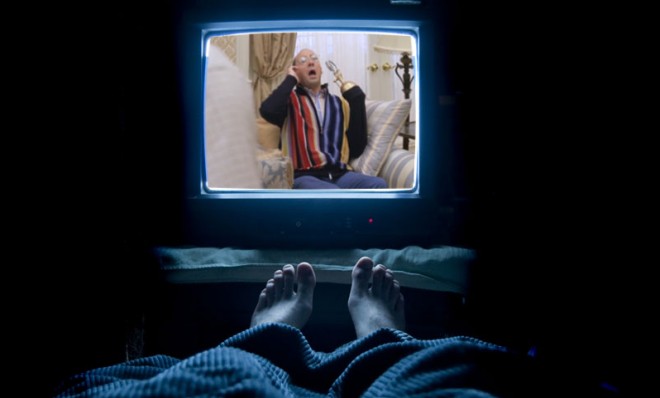Binge-watching Arrested Development was a huge mistake
There's only so much off-kilter comedy one can take

A free daily email with the biggest news stories of the day – and the best features from TheWeek.com
You are now subscribed
Your newsletter sign-up was successful
Was the long-anticipated fourth season of Arrested Development any good? My colleague, Scott Meslow, can answer that question.
I'm here to talk about my epic feat of laziness: Streaming the entire season on Netflix in a single day. I was not, a la Alex in A Clockwork Orange, forced to watch it as my editor calmly dripped saline solution into my eyes.
No, I binge-watched voluntarily, like I did before with Friday Night Lights, and like I will do again whenever Joss Whedon releases Agents of S.H.I.E.L.D. I once binge-watched a half-season of Battlestar Galactica despite having already seen the entire series. When it comes to binging on dramas, I am, sadly, a pro.
The Week
Escape your echo chamber. Get the facts behind the news, plus analysis from multiple perspectives.

Sign up for The Week's Free Newsletters
From our morning news briefing to a weekly Good News Newsletter, get the best of The Week delivered directly to your inbox.
From our morning news briefing to a weekly Good News Newsletter, get the best of The Week delivered directly to your inbox.
Comedy is different. Arrested Development creator Mitch Hurwitz warned viewers from watching all 15 episodes at once, telling New York, "Don’t feel obligated to watch it all at once. It’s a comedy! It’s not like Lord of the Rings. Comedy takes a lot out of you."
Plenty of people joined me in not taking his advice, including Kevin Smith and, awesomely enough, St. Vincent's Annie Clark:
You can hardly blame us. This was supposed to be the perfect Netflix show.
As Farhad Manjoo argued in Slate, Arrested Development, more than any other program, "depended on, and showed the potential for, new technologies that would revolutionize how we all watched TV" — a shame since it was released in 2003, before DVRs became widespread and Netflix's streaming service even existed.
A free daily email with the biggest news stories of the day – and the best features from TheWeek.com
The layers of fast-paced, self-referential jokes were perfect for re-watching, chopping up, and meme-ifying. Initially, Hurwitz wanted each episode of season four to stand on its own, so that they could be watched in any order. He later took that statement back and told audiences they should be watched sequentially.
Still, the Rashomon-style narrative device remained, with each episode focusing on a single character's point of view. Fans can still skip around without losing much of the plot.
For Brian Merchant of VICE's Motherboard, it wasn't exactly Netflix marathon-viewing nirvana:
The feat would have been innovative, to say the least. Interchangeable episodes! Made-for-Netflix-binge-watching! It would be A New Way to Watch TV — something that the Arrested Development 1.0 had been breathlessly extolled as having already accomplished. Hurwitz no doubt felt the weight of the expectations — the generational love-fest that's been directed at Arrested is far beyond that of a merely adored cancelled sitcom — he wanted to give those fans something to really tweet about Sunday morning. He was envisioning his show as a cutting edge internet product, not just good comedy. But it didn't pan out. [Motherboard]
I would have to agree. As I sat on my couch with a whole thing of candy beans, I began to fear I had made a huge mistake. The problem was that the narrative structure made binge-watching a chore.
Ron Howard — once again serving as the show's narrator — spends so much time explaining and re-explaining major plot points that the show could probably be remade into an audio book with minimal effort. After hearing him explain Cinco de Quatro or FakeBlock for the 10th time, I couldn't help but doze off for a little bit.
Jace Lacob of The Daily Beast also got tired of Howard's voice, writing, "There is so much narration — used here as a crutch rather than the comedic tool it was during the show’s Fox run — that the entire 15-episode season feels like a 'Previously on Arrested Development' segment told over eight hours."
Would the narration still annoy me if I was watching one episode every week? Perhaps, but not nearly as much as it did around hour six.
Binge-watching also works better with dramas, which depend on cliffhangers and plot twists to keep viewers engaged. Every time Battlestar Galactica revealed a new Cylon, I lost 50 minutes of sleep by hitting "Play next episode."
Comedies like Arrested Development and 30 Rock don't work that way. Yes, they have plots, but the aspects that stick out in people's minds are the clever lines and funny gags. I remember Tobias Fünke's famous phrase: "I'm afraid I just blue myself." I don't remember what happened in the episode that he said it in.
In the end, it's hard to justify watching it all in one sitting. Sadly, no amount of forget-me-nows can help me fix my mistake.
Keith Wagstaff is a staff writer at TheWeek.com covering politics and current events. He has previously written for such publications as TIME, Details, VICE, and the Village Voice.
-
 The ‘ravenous’ demand for Cornish minerals
The ‘ravenous’ demand for Cornish mineralsUnder the Radar Growing need for critical minerals to power tech has intensified ‘appetite’ for lithium, which could be a ‘huge boon’ for local economy
-
 Why are election experts taking Trump’s midterm threats seriously?
Why are election experts taking Trump’s midterm threats seriously?IN THE SPOTLIGHT As the president muses about polling place deployments and a centralized electoral system aimed at one-party control, lawmakers are taking this administration at its word
-
 ‘Restaurateurs have become millionaires’
‘Restaurateurs have become millionaires’Instant Opinion Opinion, comment and editorials of the day